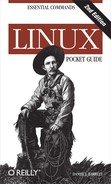Name
expr — stdin stdout - file -- opt --help --version
Synopsis
expr expressionThe expr command does
simple math (and other expression evaluation) on the command
line:
$ expr 7 + 3
10
$ expr '(' 7 + 3 ')' '*' 14 Special shell characters are quoted
140
$ expr length ABCDEFG
7
$ expr 15 '>' 16
0 Meaning falseEach argument must be separated by whitespace. Notice that we
had to quote or escape any characters that have special meaning to
the shell. Parentheses (escaped) may be used for grouping. Operators
for expr include:
|
Operator |
Numeric operation |
String operation |
|---|---|---|
|
|
Addition | |
|
|
Subtraction | |
|
|
Multiplication | |
|
|
Integer division | |
|
|
Remainder (modulo) | |
|
|
Less than |
Earlier in dictionary. |
|
|
Less than or equal |
Earlier in dictionary, or equal. |
|
|
Greater than |
Later in dictionary. |
|
|
Greater than or equal |
Later in dictionary, or equal. |
|
|
Equality |
Equality. |
|
|
Inequality |
Inequality. |
|
|
Boolean “or” |
Boolean “or”. |
|
|
Boolean “and” |
Boolean “and”. |
|
|
Does the regular
expression | |
|
|
Print
| |
|
|
Return the index of
the first position in string |
For Boolean expressions, the number 0 and the empty string are considered false; any other value is true. For Boolean results, 0 is false and 1 is true.
expr is not very efficient.
For more complex needs, consider using a language like Perl
instead.
